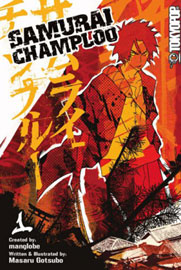 |
Title: Samurai Champloo vol 1 (Ongoing series)
UK Distributor:
Tokyopop
Author: Masaru Gotsubo (Created by
manglobe)
Suggested Retail Price (SRP): £6.99
Number of Pages: 192
ISBN: 1-5918-2282-3
Reviewed: 8th June 2006
Reviewer: Rich (Webmaster)
|
Of all the things to come out of Japan, by far the coolest is
the samurai. Highly skilled swordsmen bound by honour, helping the oppressed and
standing unmoving against insurmountable odds. So not much like the main
characters of Samurai Champloo then.
Mugen is a wild swordsman, unpredictable, short tempered and fighting for the
thrill of it. Jin is a cold calculating samurai, a man who has abandoned
the samurai code of honour and fights simply to find a purpose. When they
met they expected a good fight, what they didnít expect was for the feisty
barmaid Fuu to drag them off on a quest to find a mysterious samurai who smells
of sunflowers. So begins an action packed journey as the antagonistic trio
travel through feudal Japan, a time of deadly swordsmen and a crime, a time of
authoritarianism and, errr, hip-hop. Yes, I said hip-hop.
Samurai Champloo is pretty much like no other samurai series you have
read, packing its pages with tonnes of modern references and anachronistic urban
cool which belies itís feudal setting. However, before you grab your
katana and storm the authorís house wait, because Samurai Champloo is
also one of the finest manga series available in the UK. Despite the
modern references Samurai Champloo vol 1 is a solid and extremely cool
samurai actioner, with great characters and distinctive artwork that really
delivers a feeling of speed and power in the frequent fight scenes.
Instead of acting like a millstone around the storyís neck all of the modern
aspects blend in near seamlessly, it seems hard to believe that hip-hop culture
would combine well with feudal Japan but it does. Hip-hop is cool and
samurai are cooler, putting them together is a marriage made in heaven.
The manga is based on the superb anime of the same name, and the problem with
anime adaptations is that they either follow the anime to the letter, which
makes them a bit redundant, or try to reinterpret the existing story, often to
mixed effect. The advantage Samurai Champloo has is that the anime
has a start and an end but the middle is pretty episodic with little continuous
story. This gives the manga series an immense amount of freedom Ė as long
as it starts and ends in the right place what it does in between is up to the
author, and with such great characters and ideas to work with the quality equals
that of the anime.
As you would expect with any series featuring samurai the action quota is very
high and Mugenís break-dancing inspired fighting style is brilliant, but it also
has itís fair share of laughs too. Mugen and Jinís mutual antagonism often
leads to some very funny scenes, but itís the trioís desperate attempts to keep
above the breadline that draws the majority of the comedy. Bickering over
food is the order of the day, but my favourite moment had to be Fuuís humble
request for a job at an inn, itís amazing how many job opportunities open up for
you when you are flanked by two starving and extremely short tempered swordsmenÖ
Itís this balance of humour and action served with a hefty dollop of drama that
makes Samurai Champloo so damn readable. The short story arcs make
it a really easy book to pick up and the fact that all of them are good enough
to have walked right out of the anime is incredibly high praise. In fact
in some ways it exceeds the anime, some of the animeís slower earlier episodes
are replaced with fast paced new ones in the manga and the added insight that is
given into Jinís motivations - or struggle to find some - is brilliantly done.
To cut a long story short, Samurai Champloo vol 1 is a real 5 star manga.
It's easy to read, hugely entertaining, insanely cool and packed with a perfect
mix of action, drama and comedy. Itís one of the best manga I have read
for a long while and I canít recommend it highly enough, itís an absolutely
essential purchase.
Extras
The book starts with colour pages, which is something I always like in manga,
and is capped off with an explanation of some of the historical setting and
background info about the story. On top of this there are the usual
adverts for other Tokyopop titles and longer 'spotlights', which provide
a synopsis and some additional info for a number of forthcoming series. Ratings
Feature:
     Extras:
Extras:
  
___________________________________________________________________________ |